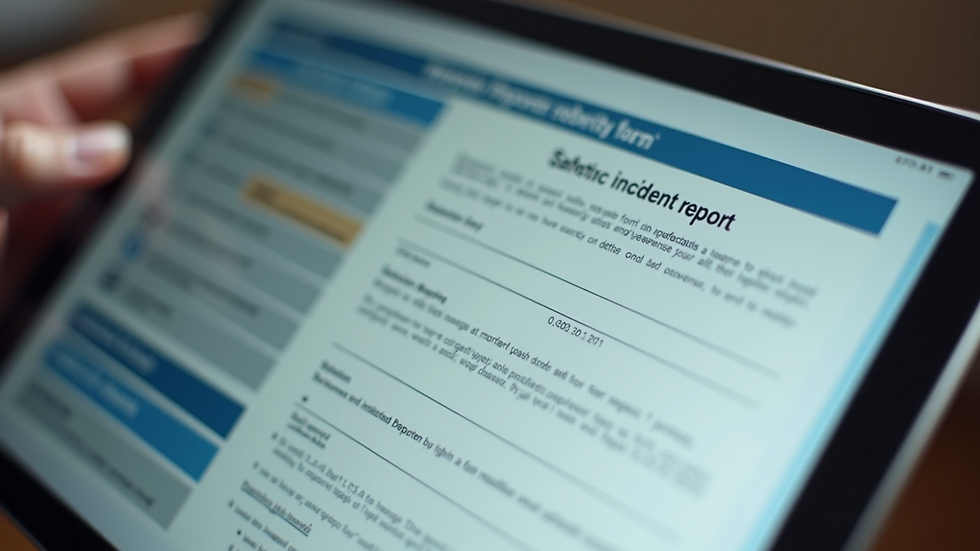Enhancing Safety with Incident Reporting Systems
- Steve Simmonds
- Aug 28, 2025
- 4 min read
Safety is not just a priority - it’s a necessity. Every business wants to protect its people and assets. But how do you make safety real and effective? The answer lies in workplace reporting tools. These tools help you spot risks early, fix problems fast, and keep everyone informed. Let’s dive into how these tools can transform your safety culture and boost your business.
Why Workplace Reporting Tools Matter
Imagine this: a small slip-up happens on the shop floor. If it goes unreported, it could lead to a serious accident later. But if you catch it early, you can prevent harm. That’s the power of workplace reporting tools. They make it easy to report incidents, near misses, and hazards.
Here’s why they matter:
Speed: Quick reporting means faster action.
Clarity: Clear records help you understand what went wrong.
Prevention: Spot trends before they become disasters.
Compliance: Stay on top of legal and safety standards.
Engagement: Encourage everyone to take part in safety.
Using these tools, you create a safety net that catches problems before they grow. It’s not just about rules - it’s about care.

How Workplace Reporting Tools Improve Safety
Workplace reporting tools are more than just forms or apps. They are your frontline defence. Here’s how they make a difference:
Easy Access
Employees can report incidents anytime, anywhere. Mobile apps and online forms remove barriers. No more delays or excuses.
Standardised Data
Consistent reporting means better data. You can compare incidents, identify patterns, and make informed decisions.
Real-Time Alerts
Managers get instant notifications. They can respond quickly, assign tasks, and track progress.
Data Analysis
Powerful dashboards and reports show trends and hotspots. You can focus resources where they matter most.
Training and Feedback
Use reports to improve training programs. Share lessons learned to prevent repeats.
By using workplace reporting tools, you turn safety from a reactive chore into a proactive strategy.

What Systems For Incident Reporting Have We Developed?
Working closely with a client we have developed a variety of systems to manage safety and incident reporting. Using Power Apps and SharePoint, over 150 remote locations are able to report safety incidents across the UK. This system helps the clent learn from mistakes and improve employee and customer safety.
Easy incident logging by staff
Categorisation of incidents by severity and type
Automated alerts to relevant teams
Detailed analytics for risk management
This approach shows how a well-designed reporting system can improve safety and create a safe environment for all. It’s a great example for any business aiming to enhance safety.

How to Choose the Right Workplace Reporting Tool
Choosing the right tool can feel overwhelming. There are many options, each with different features and costs. Here’s a simple checklist to guide you:
User-Friendly Interface
Your team should find it easy to report incidents without frustration.
Mobile Compatibility
Ensure the tool works on smartphones and tablets for on-the-go reporting.
Customisable Forms
Tailor the reporting fields to your industry and risks.
Automated Notifications
Alerts help managers act quickly.
Data Security
Protect sensitive information with strong security measures.
Integration
Can it connect with your existing systems like HR or compliance software?
Reporting and Analytics
Look for dashboards that provide clear insights and trends.
Support and Training
Choose a provider that offers good customer support and training resources.
By focusing on these factors, you’ll find a tool that fits your business and boosts your safety culture.
Unlocking the Power of Data with Incident Reporting Systems
Data is your secret weapon. But raw data alone won’t improve safety. You need to turn it into action. That’s where a smart incident reporting system comes in. It collects, organises, and analyses your safety data in one place.
Here’s how it helps:
Identify Hidden Risks
Spot patterns that aren’t obvious from individual reports.
Track Improvements
Measure the impact of safety initiatives over time.
Prioritise Resources
Focus on the most critical issues first.
Engage Leadership
Present clear, visual reports that get buy-in from decision-makers.
Drive Continuous Improvement
Use data to refine policies and training regularly.
Latitude53 specialises in helping businesses unlock the full potential of their data using the Microsoft Power Platform. With the right tools, you can streamline operations, drive growth, and make smarter decisions - all while enhancing safety.
Taking the First Step Towards Safer Workplaces
Ready to make safety a strength? Start small but think big. Here’s a simple plan:
Assess Your Current Reporting Process
What works? What doesn’t? Where are the gaps?
Engage Your Team
Get feedback from employees on what they need to report incidents easily.
Choose a Tool That Fits
Use the checklist above to find the right workplace reporting tool.
Train and Communicate
Make sure everyone knows how and why to report incidents.
Review and Act on Data
Use reports to fix problems and celebrate improvements.
Keep Improving
Safety is a journey, not a destination.
By following these steps, you build a culture where safety is everyone’s business. It’s a win for your people and your bottom line.
Safety is a team effort. With the right workplace reporting tools, you empower your team to speak up, act fast, and keep your business safe. Don’t wait for accidents to happen. Start enhancing safety today and watch your business thrive.
Take Action Now!
Contact us today to learn more about our workplace reporting tools and how they can transform your safety culture. Together, let's create a safer environment for everyone!


